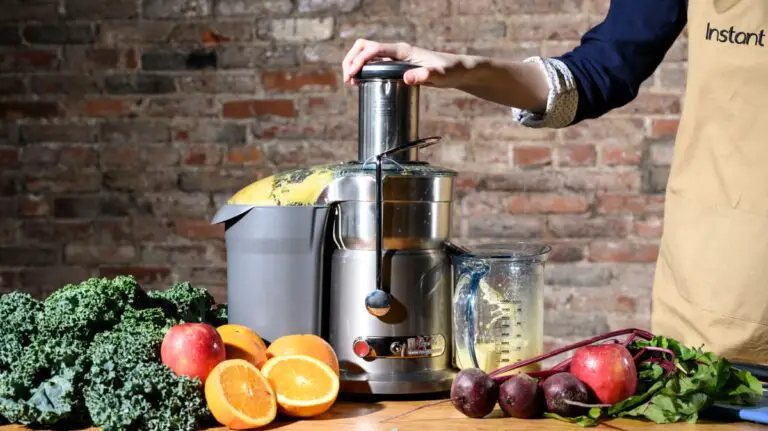Why Did My Juicer Stopped Working?
When we rely on our trusty juicer to extract the goodness from our fruits and vegetables, it can be frustrating when it suddenly stops working. But fear not, as there are several common reasons why your juicer might be giving you trouble.
Firstly, it could be due to a clogged filter or a jammed blade, so make sure to give them a thorough cleaning. Secondly, check if the motor is overheating or if there’s a loose connection. Lastly, ensure that you’re using the correct voltage and that the juicer is properly assembled. By addressing these issues, you’ll soon be back to enjoying your favorite nutritious juices.

Table of Contents
Common Reasons for a Juicer Not Working
1. Power Supply Problems
One common reason for a juicer not working is issues with the power supply. Make sure that the juicer is properly plugged into a functioning power outlet. Check the power cord for any damage or loose connections. If the juicer has a power switch, ensure that it is turned on. Additionally, check if there is a power outage in your area.
2. Overheating
Overheating can also cause a juicer to stop working. Using the juicer continuously for a long time can lead to the motor overheating. This can result in the juicer automatically shutting down to prevent further damage. Allow the juicer to cool down before using it again. Consider using the juicer in shorter intervals to prevent overheating.
3. Blocked or Clogged Parts
Blocked or clogged parts can hinder the proper functioning of the juicer. Check the feeder tube, strainer, and other components for any obstructions. Remove any fruits, vegetables, or pulp that may be stuck in these areas. Cleaning the juicer thoroughly after each use can help prevent clogging problems. Follow the manufacturer’s instructions for proper cleaning techniques.
4. Defective Motor or Switch
A defective motor or switch can be a more serious cause of a juicer not working. If none of the above issues are present and the juicer still does not work, there may be an internal problem. Contact the manufacturer or a professional technician for further assistance. It may be necessary to repair or replace the motor or switch.
By addressing these common reasons for a juicer not working, you can troubleshoot and potentially resolve the issue. Always refer to the manufacturer’s guidelines and seek professional help if needed.
Expert Tips: Ensure proper power supply, prevent overheating, check for blockages, and seek professional assistance if needed.Troubleshooting Steps for a Non-Working Juicer
Step 1: Check the Power Source
First, ensure that your juicer is properly connected to a functioning electrical outlet. If you’re using an extension cord, make sure it’s in good condition and supplying power. Loose connections or tripped circuit breakers can make the juicer appear non-functional.
Step 2: Inspect for Overheating
Juicers can overheat if used for too long or if the motor is overloaded. Allow the juicer to cool down for a few minutes and try using it again. Follow the manufacturer’s instructions on recommended usage times to prevent overheating. If the juicer keeps overheating, it may indicate a larger issue requiring professional repair.
Step 3: Clear Any Blockages or Jams
Blockages or jams can cause the juicer to stop working. Turn off the juicer and unplug it before attempting to clear any obstructions. Check the feed chute, cutting blades, and pulp collector for stuck fruits or vegetables. Remove any obstructions carefully, then reassemble the juicer. Restart it to see if it functions properly.
Step 4: Test the Motor and Switch
If the juicer still doesn’t work after checking the power source, overheating, and clearing blockages, you may need to test the motor and switch. Make sure the juicer is unplugged before proceeding. Consult the manufacturer’s instructions to access the motor and switch. Use a multimeter to check if the motor is receiving power. If it’s not, it could indicate a faulty switch or wiring that requires professional repair.
In summary, when troubleshooting a non-working juicer, start by checking the power source, inspect for overheating, clear any blockages or jams, and test the motor and switch. If these steps don’t resolve the issue, consult a professional juicer repair service for further assistance.
| Reasons for juicer not working: |
|---|
| – Loose connection or tripped circuit breaker |
| – Overheating due to extended usage or motor overload |
| – Blockages or jams in the juicer |
| – Faulty motor or switch |
Tips for Maintaining Your Juicer and Preventing Malfunctions
1. Regular Cleaning and Maintenance
To ensure your juicer continues to work efficiently, it is important to clean and maintain it regularly. Follow these tips:
- Clean the juicer after each use: Take apart the juicer and wash all removable parts with warm soapy water. Use a brush to remove any pulp or residue.
- Remove tough stains: If there are stubborn stains, soak the parts in a mixture of warm water and lemon juice or vinegar. Gently scrub to remove the stains.
- Dry all parts thoroughly: After washing, ensure that all parts are completely dry before reassembling the juicer. Moisture can lead to mold or damage the motor.
- Regularly clean the filter: The juicer’s filter can become clogged with pulp and affect the juicing process. Clean it thoroughly to maintain optimal performance.
2. Proper Assembly and Disassembly
Improper assembly and disassembly can cause your juicer to malfunction. Follow these guidelines:
- Refer to the user manual: Read the instructions provided by the manufacturer to understand the correct assembly and disassembly process.
- Handle parts with care: Be gentle when attaching or removing parts to avoid any damage that may affect the juicer’s functionality.
- Ensure proper alignment: Make sure all parts are aligned correctly before locking them in place. Misalignment can result in the juicer not working as intended.
3. Avoid Overloading the Juicer
Overloading the juicer with an excessive amount of produce can cause it to stop working. Follow these tips:
- Follow the juicer’s capacity guidelines: Every juicer has a maximum capacity. Make sure not to exceed it to prevent strain on the motor.
- Cut produce into smaller pieces: Large chunks of fruits or vegetables can put excessive pressure on the juicer. Cut them into smaller pieces for better juicing results.
- Alternate between soft and hard produce: To avoid overwhelming the juicer, alternate between juicing soft and hard produce. This helps distribute the workload more evenly.

Seeking Professional Assistance for Juicer Repair
If your juicer has stopped working and you have exhausted all troubleshooting options, it may be time to seek professional assistance for repair. Here are two options you can consider:
Contacting the Manufacturer or Retailer
If your juicer is still under warranty or if you purchased it recently, contacting the manufacturer or retailer should be your first step. They may be able to provide you with guidance on how to fix the issue or offer a replacement if necessary.
When reaching out to the manufacturer or retailer, be sure to provide them with all the necessary details such as the model number, purchase date, and a clear description of the problem. This will help them assess the situation and provide you with the best possible solution.
Consulting a Professional Repair Service
If your juicer is no longer under warranty or if you prefer not to contact the manufacturer, consulting a professional repair service is another viable option. These repair services specialize in fixing appliances like juicers and have the expertise to diagnose and repair various issues.
When choosing a repair service, it’s essential to look for a reputable and experienced provider. Read reviews, ask for recommendations, and inquire about their qualifications and certifications. It’s also a good idea to inquire about the estimated cost of repairs before proceeding.
Remember, seeking professional assistance for juicer repair can help you get your appliance back up and running efficiently, allowing you to continue enjoying fresh and healthy juices.
| Information |
|---|
| Consider contacting the manufacturer or retailer if your juicer is under warranty or recently purchased. |
| Consult a professional repair service for expert assistance in diagnosing and fixing juicer issues. |
| Ensure the repair service is reputable and inquire about the estimated cost of repairs. |
The Significance of a Functional Juicer
1. Nutritional Advantages of Juicing
Juicing is a great method to add a wide range of fruits and vegetables to your diet, providing essential vitamins, minerals, and antioxidants. By extracting the juice from fresh produce, you can easily consume a concentrated amount of nutrients that may be difficult to obtain in sufficient quantities. Drinking freshly squeezed juice can enhance your immune system, improve digestion, and promote overall well-being.
2. Economical and Convenient Juicing
Investing in a functional juicer can be a cost-effective solution for obtaining high-quality juices. Store-bought juices can be costly, contain added sugars, and may lack the freshness and nutritional value of homemade juices. With a reliable juicer at your disposal, you can create your own customized blends using fresh ingredients, ensuring optimum freshness and nutrition.
In addition, a functional juicer offers convenience and time-saving benefits. It allows you to quickly prepare a glass of juice whenever you want, without the need for extensive preparation or cleanup. Whether you prefer a refreshing morning juice or a post-workout energy boost, having a functional juicer readily available can simplify the process and encourage regular consumption of nutritious juices.
Moreover, a functional juicer can also help reduce food waste. It enables you to utilize fruits and vegetables that may be slightly overripe or nearing their expiration date, preventing them from being wasted. By juicing these ingredients, you can still extract their nutritional benefits and contribute to a more sustainable lifestyle.
Conclusion
There can be several reasons why a juicer may stop working. It could be due to a clogged or damaged filter, motor issues, improper assembly, or overload.
Regular maintenance and cleaning, as well as following the manufacturer’s instructions, can help prevent such problems. If your juicer has stopped working, it is recommended to troubleshoot the issue by checking for any visible blockages, ensuring proper assembly, and contacting customer support if needed. By taking these steps, you can prolong the lifespan of your juicer and continue enjoying fresh and healthy juices.
Faq about Why Did My Juicer Stopped Working?
FAQ 1: Can I repair my juicer on my own?
Yes, you can repair your juicer on your own if you have the necessary knowledge and skills. That being said, it is recommended to consult the manufacturer’s manual or reach out to their customer support for guidance on specific repairs. Attempting repairs without proper knowledge may cause further damage.
FAQ 2: How often should I clean my juicer?
It is important to clean your juicer after each use to maintain its performance and longevity. Leaving residual pulp or juice in the juicer can lead to clogging and damage over time. Refer to the manufacturer’s instructions for specific cleaning guidelines.
FAQ 3: Can I use my juicer if it’s making unusual noises?
If your juicer is making unusual noises, it is advisable to stop using it immediately. Unusual noises could indicate a mechanical issue or a loose component that may further damage the juicer. Contact the manufacturer’s customer support for assistance or take it to a professional repair service.
FAQ 4: What should I do if my juicer keeps overheating?
If your juicer keeps overheating, it is likely due to overuse or a malfunctioning motor. Allow the juicer to cool down and avoid using it for an extended period. Check the manufacturer’s instructions for recommended usage time and if the issue persists, contact their customer support for troubleshooting or repair options.
FAQ 5: Is it worth repairing an old juicer or should I buy a new one?
The decision to repair or replace an old juicer depends on the extent of the damage and the cost of repairs. If the repairs are minor and cost-effective, it may be worth repairing the juicer. That being said, if the repairs are extensive or close to the cost of a new juicer, it might be more practical to invest in a new one. Consider factors like warranty, availability of parts, and the overall condition of the juicer when making this decision.
Read Similar Post:
1. Joe Cross’s Top Recommended Juicer: Find the Perfect Brand and Model for Your Juicing Journey
2. Mixer Grinder vs Juicer Mixer Grinder: Unveiling the Key Distinctions


